I’M IN SEMI-RETIREMENT AND THIS BLOG IS WINDING DOWN. I INTEND CALLING IT A DAY IN THE NEXT FEW MONTHS. POSTINGS WILL PROBABLY BE LESS FREQUENT AND I WILL NOT UNDERTAKE ANY MAJOR NEW INVESTIGATIONS. DIOLCH YN FAWR.
♦
![]() This post is a ‘filler’ until we return to that cornucopia of dissembling, skulduggery, and now whimpering, put-upon Marxists – YesCymru! Possibly with a post at the weekend.
This post is a ‘filler’ until we return to that cornucopia of dissembling, skulduggery, and now whimpering, put-upon Marxists – YesCymru! Possibly with a post at the weekend.
∼
Most of you will I’m sure have heard that the old slate quarries and mines of Gwynedd have been awarded UNESCO World Heritage status.
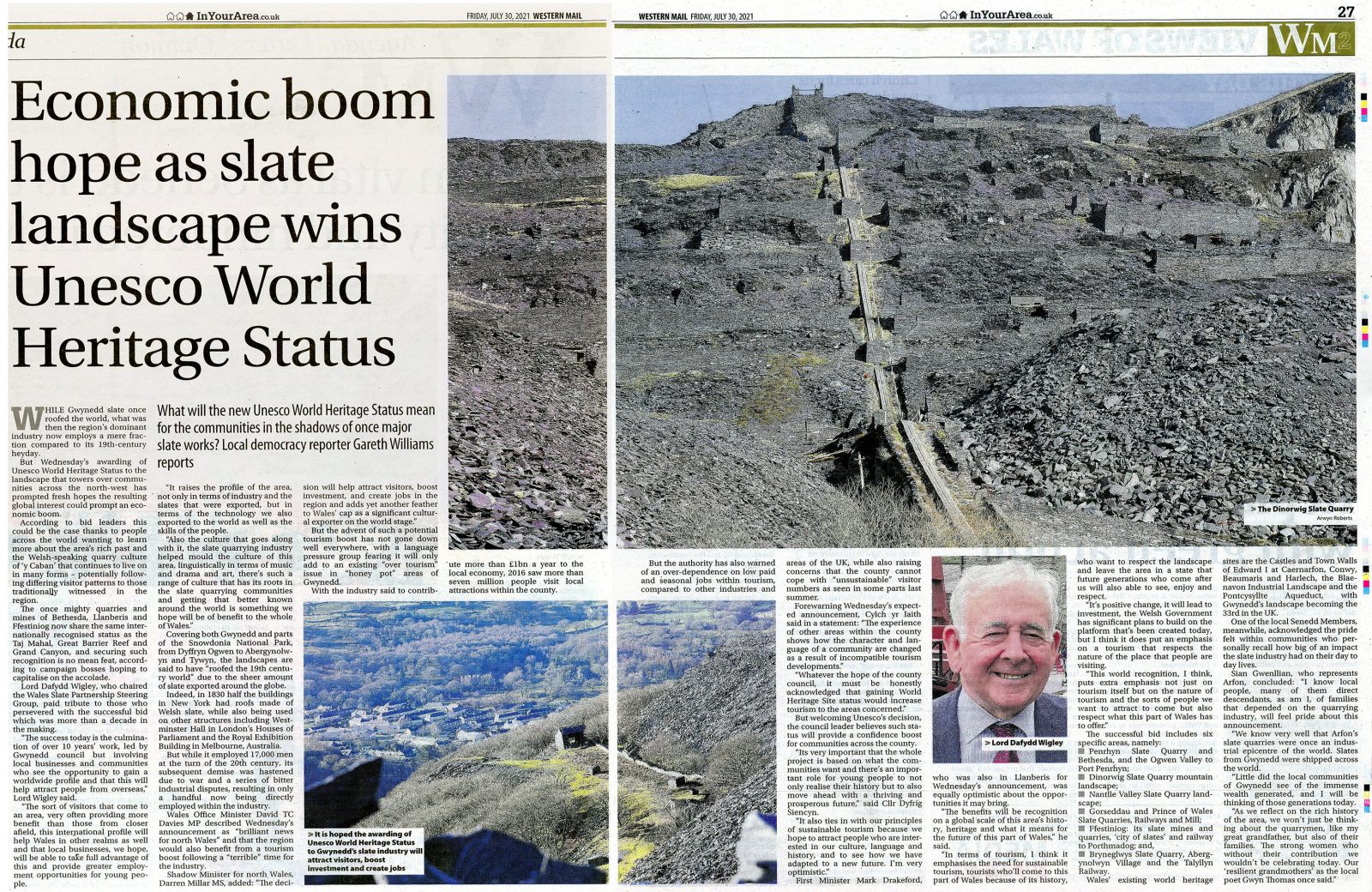
(Here’s the above article in pdf format.)
Even though I live very close to a former slate quarry, Bryneglwys, in a village largely built in the 19th century to house the quarrymen and their families, and even though I’ve been (loosely) involved with the local preparations of the bid to UNESCO, like many others I’m wondering how exactly my community will benefit.
Let me explain.
I first learnt of the UNESCO bid in the autumn of 2019. There was a meeting or a presentation in our Ganolfan organised by Gwynedd county council. So, ever the inquisitive, I rolled up to see what it was all about.
There were a few guys there who seemed to be running the show, and I assumed they worked for Cyngor Gwynedd; but no, they were from the Talyllyn Railway (TR). Which I found to be rather surprising, and disappointing.
The people of Abergynolwyn, many of them the children, grandchildren or great-grandchildren of quarrymen, knew little or nothing about the UNESCO bid, and yet the Talyllyn Railway not only knew about it but also seemed to have commandeered its local element.
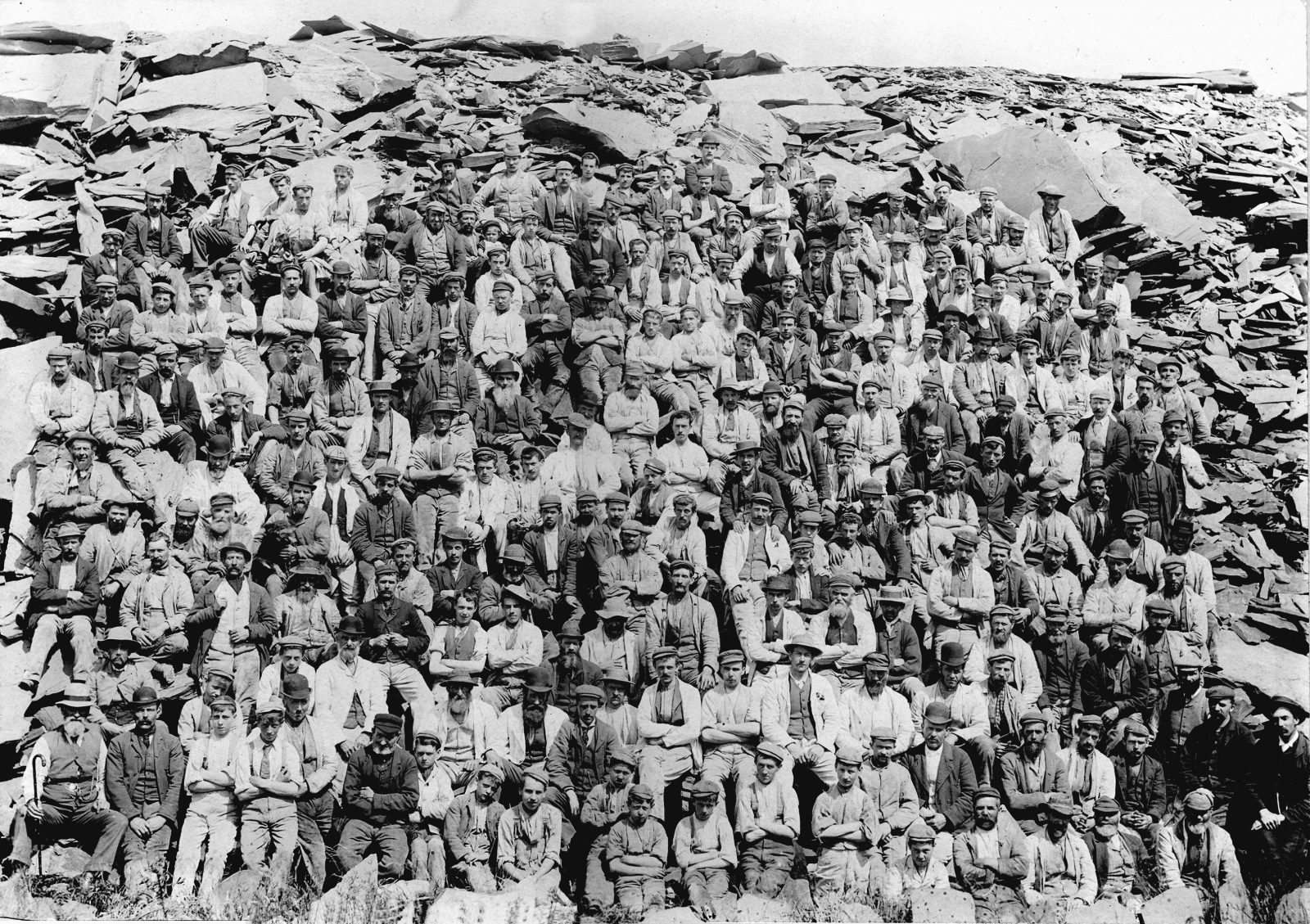
Worse, projects in Tywyn, having only the most tenuous connection with the slate industry, also had bids in for their slices of the cake.
Another at the meeting was the owner of ‘King Arthur’s Labyrinth‘ in Corris, located in the old tunnels dug and blasted to extract slate in the next valley. This place is to Welsh history what Boris Johnson is to statesmanship.
For those unfamiliar with the area, Corris is the most southerly of the Gwynedd slate communities and on the same seam as Bryneglwys.
But back to the Talyllyn Railway.
∼
Some twenty years ago, I was raising the money to build our new Ganolfan. Not an easy job, and at times dis-spiriting. To fill out a 60-page application form, make sure that all the attachments are in place, and then get a curt response that says, basically, ‘Hard luck, pal’, is very frustrating.
One example was an application I made to the Aggregates Levy Sustainability Fund (ALSF). I think the figure I applied for was £200,000.
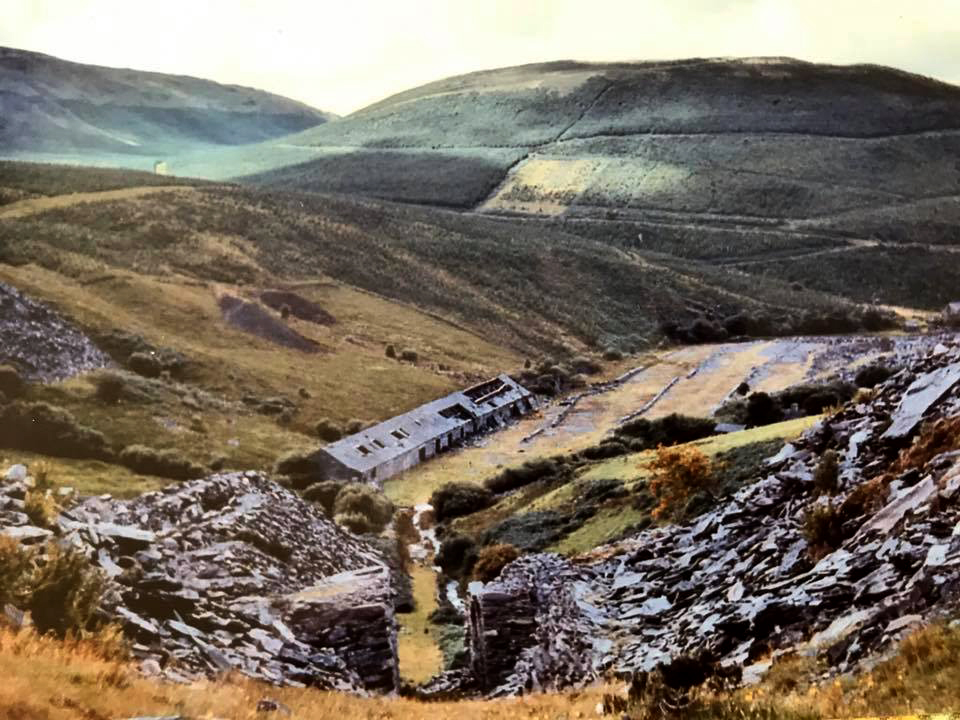
Anyway, the point was that this funding was for communities within 5 miles of a quarry or aggregate workings. So, I filled up the form, sent it off, and a representative of the ALSF came to discuss it. ‘No problem’, says he, ‘you meet all the criteria . . . but of course it will have to go before the panel’.
The panel, or rather the two who swung the decision – both involved in tourism – decided that the grant should go to the Talyllyn Railway. To be spent on its Wharf Station in Tywyn, over 7 miles from Bryneglwys quarry.
The justification given was that the TR had a closer link than the village with the quarry. And the track itself came within the required 5 miles!
Now, I don’t deny that the railway was built to carry slate to the coast and the main line, but it is now a commercial enterprise, a tourist railway, run almost exclusively by ‘enthusiasts’ from over the border.
Whereas the village of Abergynolwyn, as I’ve said, was built to serve the quarry, and is still home to descendants of the quarry workers. (My wife among them.)
∼
Another reason I’m less than optimistic relates to the ownership of Bryneglwys quarry.
For the Land Registry title document says that in 1980 Bryneglwys passed from Hugh Pugh Roberts to the Secretary of State for Wales. Then, in 2006, it transferred to the National Assembly for Wales.
The quarry is now in the stewardship of our old friends at Natural Resources Wales (NRW). Where they seem to believe that it’s near Machynlleth.
Which I suppose it is . . . if you’re a particularly energetic crow; or if you fancy climbing a few miles up to the ridge and then, after getting your breath back, negotiating a few more miles on t’other side as you descend into the Dyfi valley. (But you do get a nice view of Cader Idris and you can see down to the coast.)
The reason the mention of NRW saw my spirits sink is because of that agency’s record. In just the previous post on this blog we read about Natural Resources Wales offering up publicly-owned Welsh land to foreign investors who are thinking of plonking on it the tallest wind turbines we’ve yet seen.
Put together the tourism element and the involvement of Natural Resources Wales and you should understand why I’m not optimistic that locals will see many benefits from the UNESCO recognition.
Added to which is a real danger that the former slate communities will see increased numbers of tourists. With all the attendant problems. This is what Cylch yr Iaith fears. And they aren’t the only ones.
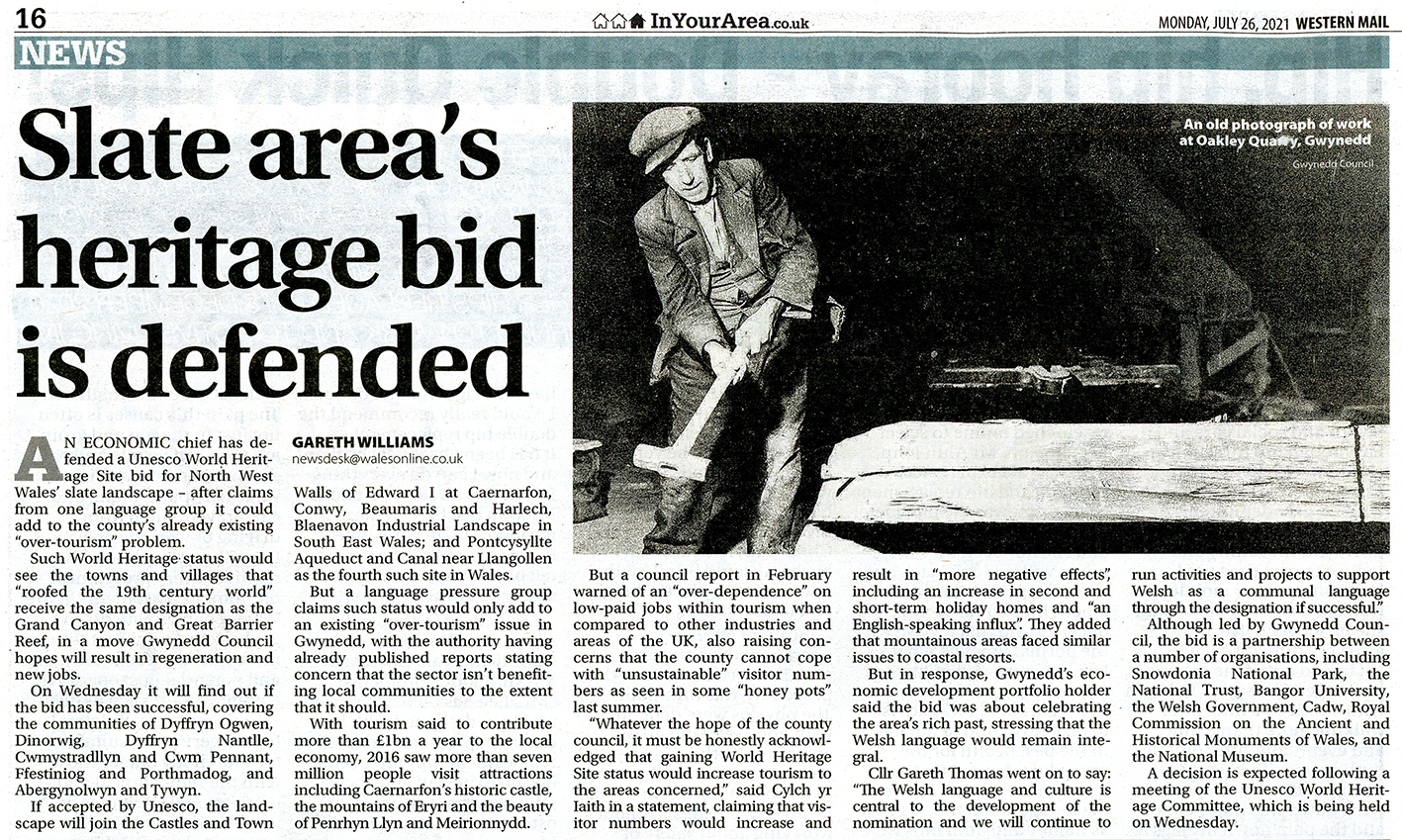
Which brings us to the fundamental conundrum.
Gwynedd council led the UNESCO bid, and champagne corks have been popping in Caernarfon since the decision was announced. And yet . . . the council has publicly conceded that certain parts of the county suffer unsustainable numbers of tourists.
Yet powerful lobbies will seek to exploit the UNESCO recognition to attract more tourists in order to make more money. More tourists means more traffic, more rubbish, more people looking to buy property, more pressure on Welsh-speaking communities.
To complicate matters, Bryneglwys quarry, unlike the larger sites at Blaenau Ffestiniog and Bethesda, is inside the Snowdonia National Park. So there’ll be no zip wires or underground trampolines.
But that aside, the overarching question remains . . .
How does Gwynedd square this circle of capitalising on UNESCO recognition without encouraging unsustainable and damaging levels of tourism?
∼
A further issue I have with this project is the way it has portrayed the relationship between Wales and England.
Here’s what our Secretary of State had to say about the announcement. ‘Fantastic news for the UK’, and he’s right. For we can guarantee that most of the beneficiaries will come from over the border.
It might also encourage more English people to ‘staycation’ in Wales thereby keeping their money in the UK. Which is a major reason why Wales suffers saturation tourism.
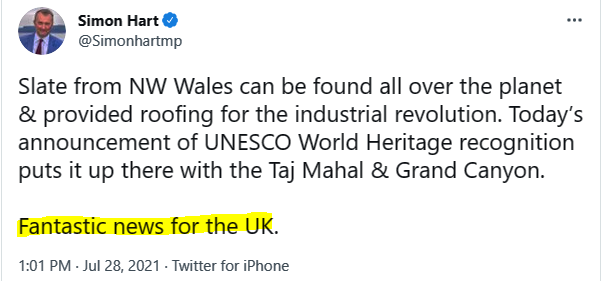
But it’s not just Simon Hart who’s guilty of misrepresenting the relationship. About a year or so ago the council commissioned a series of films, one for each of the quarries involved in the UNESCO bid.
The film for Bryneglwys focused almost entirely on the tenure of the McConnel brothers of Manchester, stressing that without English money there would have been nothing here. There was little mention of the men who worked – and died – at the quarry, their families, and the lives of the people of Abergynolwyn.
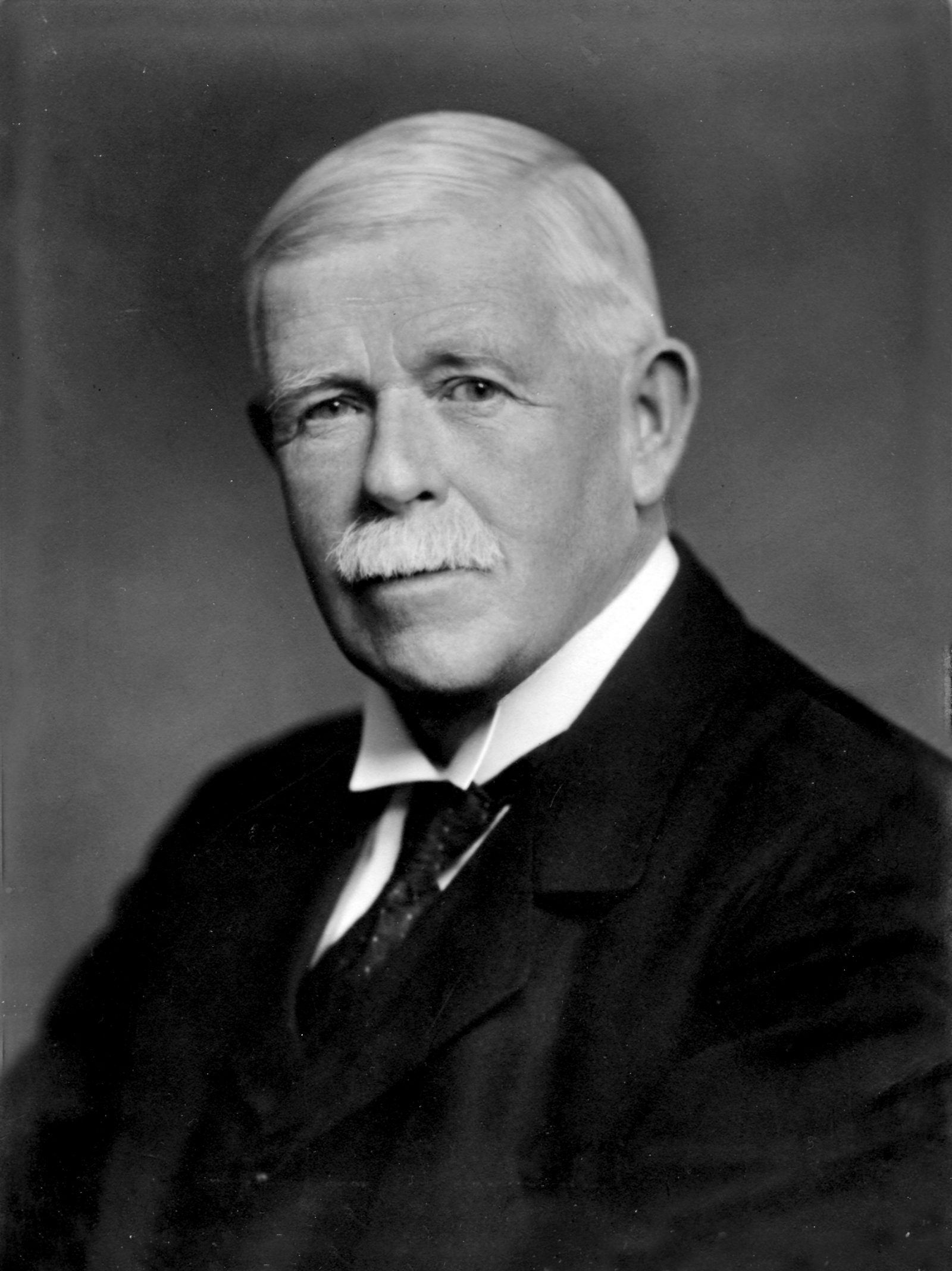
The truth is that slate was extracted in the 1820s, possibly earlier, by local men prepared to invest a bit of money and hard work. The McConnels arrived in 1864 because cotton was not reaching their Manchester mills from the Confederate states due to the war, and so they looked to diversify. In the third act, local MP, Sir Henry Haydn Jones took over in 1911, and kept the quarry open long after it ceased to be economically viable.
Certainly, the McConnels invested a lot of money, but they weren’t philanthropists, they came to make money, and if there hadn’t already been slate workings here they would never have heard of Bryneglwys. Yet the film commissioned by Cyngor Gwynedd wrote out the Welsh involvement entirely!
Another film, by Dr David Gwyn, put up on YouTube last week, is not a great improvement in its emphasis.
https://youtu.be/D0kRo7E3NzQ
Even this page from Llechi Cymru concentrates on the McConnels, with just a nod to those who went before, and no mention at all of Sir Henry Haydn Jones.
If I was one of those frightful nationalists I might view this ‘Can’t manage without England’ theme as fairly obviously political. Perhaps we’ll hear it again when the tourists start swamping the communities that have been blessed with UNESCO recognition.
And once again, we shall be expected to show gratitude for becoming strangers in our own communities, and our own country.
♦ end ♦


My condolences for the loss of the grant. How’d you all at the Ganolfan pull through in the end?
The two long standing big cheeses in Talyllyn Railway are from English Midlands. The one from Birmingham is a loudmouth. (Got my own back on him recently and he’s still smarting!)
You are entitled to your views on UNESCO, of course. I accept that it has shown evidence of failings similar to a number of other UN agencies over the past 75 years – over-politicisation, over-bureaucratisation, and high principles not fully reflected in their low practical outputs.
But in accusing UNESCO of ‘a form of sovereignty’ over parts of Gwynedd, and of globalist imperialism, thou doth protest too much, methinks. After all, it conferred this same international heritage status on two Gwynedd castles, Caernarfon and Harlech, 35 years ago. Those structures most certainly represent real colonisers and the overweening sovereigns of their epoch: hence the brutal beauty of their legacy. UNESCO thankfully has no such fiscal or military strength, and might stretch to an occasional flag, plaque and leaflet in the fullness of time at Bryneglwys and the other llechi sites. I for one can live with that form of internationalism.
I think this is a reply to me Steffan!? An interesting take but a take which could perhaps be described as well meaning but naive. ‘Internationalism’ in its modern usage seems to be another word which well meaning and altrusitic people have adopted to show their no-doubt genuine virtue and concern for the rest of the world but which has been covertly acquiesced by the fascist globalist one world government agenda for their own purpose.
I think most decent people are internationalist in the sense that they celebrate being part of a family of diverse nations on earth but this well intentioned and decent principle has been hijacked by those with less well intentioned plans.
Regardless of all that, simply allowing a non-elected globalist body to seemingly claim ownership of large parts of Wales is plain wrong in terms of this not having having gone through any proper democratic scrutiny in our Welsh Parliament for example – or being subject to a local referndum by the citizens of Gwynedd. You might be ok to live with this form of internationalism yourself but we live in a liberal democracy and the people must utimately decide
Well put. ‘Internationalism’ is often left wing code for unrestricted immigration and other idiocies. We have to look behind these words to get their true meaning. Just think of what’s happened to YesCymru, taken over by people preaching ‘inclusivity’. One of the first things they did was suspend the only BAME member of the Central Committee!
“Internationalism” is very nice in theory but in practice gets hijacked by the manipulators regardless of whether they label themselves right, left or centre. Today we are confronted by an as yet unresolved combination of corporate, statist and other institutional parties all vying for the pole positions. One thing they have in common is that they want to call the shots. As yet the NWO isn’t with us but these schemers are all aiming for it. Whatever the precise political labels of the final lineup will not matter much at all to us who are intended only for serfdom.
It could all be led by Boris and his Short Attention Span party or by Putin and his Nice Misunderstood Russian Front, and others of equally dubious provenance, and likes of you and I will play no part at all. Communities will be subverted or destroyed with likes of that twat Monbiot ( unless he’s deemed to be an unbeliever) pushing a green gospel modified to suit the needs and priorities of the rulers. Need to save the planet will be used to constrain our behaviours while the elites will live the grand life jetsetting from one conference to another to rearrange our lives for the greater good.
I guarantee some prick Fleet Street columnist writing in a property supplement in the Daily Mail or Telegraph will undergo a jingoistic onanism over the resultant increase in property prices. Funny how salvation in the form of investment in the quarry came from up east, nothing at all to do with the disparity in wealth and opportunity that exists between us, of course!? The same story back then, and always was and shall be (unless we grasp the nettle and make change happen).
I’m sure the second- homers and holiday-homers will be well chuffed. They can now say “and it overlooks a UNESCO heritage site dahling”
UNESCO is just another of those windbag bodies that enables globalisation of culture and sanitisation of history to suit the objectives of the hidden manipulators who lurk within governments, large global corporates and their pals in equally large financial institutions. There are whole rafts of other pawns all gagging to be most useful to this deceitful venture. As for real benefits well hardly any if at all. Check out Blaenafon and surrounding area. Meaningful employment opportunities within those communities have been diminished by “progress” and now these devious creeps want us to believe that telling tales of exploitation enriches us in some way. Bullshit !
(*More so Edward the 1st…)
Yep, worries me immensely who will be scrapping for the cash benefits…..wont be the locals, that’s for sure. Perhaps they can establish a museum, like the one that focusses on “slavery” in the Albert Dock, in Liverpool, that concentrates on Lord Penrhyn’s abuse of his workers, and how they were treated as virtual indentured slaves…..perhaps not, but tourists can slope off to see his dirty pile, on the banks of the Menai, built from the lifeblood of the people from the mining communities.
It’s very bizarre, almost tragically comical, how people are celebrating and fawning at the fact that a large area in Gwynedd has been declared a UNESCO site. It’s as if people are utterly unable to make basic research in to what UNESCO is about.
UNESCO is an an unelected branch of the also unelected creepy global octopus, the UN. It’s whole purpose from the start has been to try and prepare the world for a one world government using the banners of education, science and culture. One of its founder members and first director was Julian Huxley, a hard core eugenicist and drooling one world government fanatic. He wrote some lovely prose such as the following:
“We shall presently recognize in nationalism the major obstacle to development of world-mindedness. We are at the beginning of a long process of breaking down the wall of national sovereignty. UNESCO must be the pioneer.”
And this…
“In its education program it can stress the ultimate need for world political unity and familiarize all people with the implications of the transfer of full sovereignty from separate nations to a world organization…political unification in some sort of world government will be required”
Giving the UNESCO globalist body a large chunk of Gwynedd essentially means they have a form of sovereignty over this land. This can basically be described as just another form of colonialism, feudalism or globalist imperialism, no different to what Edward the second and the Normans attempted in Wales a few years back. The imperialists are still desperately trying to get their grubby hands on Wales.
It’s a mystery why some Welsh folk want to, literally, give strangers a big chunk of our country and thank them for taking it. We should let people know what UNESCO is really about and cancel and reverse these four imperialist UNESCO sites in Wales. If we want to have Welsh heritage sites, we can declare them ourselves, keep ownership of them and profit from them ourselves.
That was an aspect I should perhaps have explored, but it’s a big subject, and this post was just a ‘filler’.
Your analysis is spot on Gruff. You can obviously see the bigger picture.
(Minor corrections – ‘Its’ not ‘It’s’, and Edward the 1st more than Edward the 2nd if being very specific…)